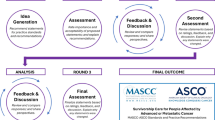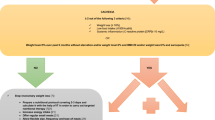Abstract
A significant proportion of cancer patients and survivors are age 65 and over. Older adults with cancer often have more complex medical and social needs than their younger counterparts. Geriatric medicine providers (GMPs) such as geriatricians, geriatric-trained advanced practice providers, and geriatric certified registered nurses have expertise in caring for older adults, managing complex medical situations, and optimizing function and independence for this population. GMPs are not routinely incorporated into cancer care for older adults; however, their particular skill set may add benefit at many points along the cancer care continuum. In this article, we review the role of geriatric assessment in the care of older cancer patients, highlight specific case scenarios in which GMPs may offer additional understanding and insight in the care of older adults with cancer, and discuss specific mechanisms for incorporating GMPs into oncology care.
Similar content being viewed by others
References
Papers of particular interest, published recently, have been highlighted as: • Of importance •• Of major importance
Balducci L. Epidemiology of cancer and aging. J Oncol Manag Off J Am Coll Oncol Adm. 2005;14(2):47–50.
Jemal A, Siegel R, Xu J, Ward E. Cancer statistics, 2010. CA Cancer J Clin. 2010;60(5):277–300.
Pal SK, Hurria A. Impact of age, sex, and comorbidity on cancer therapy and disease progression. J Clin Oncol. 2010;28(26):4086–93.
Hurria A, Lachs MS, Cohen HJ, Muss HB, Kornblith AB. Geriatric assessment for oncologists: rationale and future directions. Crit Rev Oncol Hematol. 2006;59:211–7.
Koroukian SM, Murray P, Madigan E. Comorbidity, disability, and geriatric syndromes in elderly cancer patients receiving home health care. J Clin Oncol. 2006;24(15):2304–10.
Jorgensen TLHJ, Land LH, Herrstedt J. Comorbidity and polypharmacy in elderly cancer patients: the significant on treatment outcome and tolerance. J Geriatr Oncol. 2010;1(2):87–102.
Ahles TA, Saykin AJ, McDonald BC, et al. Longitudinal assessment of cognitive changes associated with adjuvant treatment for breast cancer: impact of age and cognitive reserve. J Clin Oncol. 2010;28(29):4434–40.
Mandelblatt JS, Jacobsen PB, Ahles T. Cognitive effects of cancer systemic therapy: implications for the care of older patients and survivors. J Clin Oncol. 2014;32(24):2617–26.
Luciani A, Jacobsen PB, Extermann M, et al. Fatigue and functional dependence in older cancer patients. Am J Clin Oncol. 2008;31(5):424–30.
Wildiers H, Heeren P, Puts M, et al. International society of geriatric oncology consensus on geriatric assessment in older patients with cancer. J Clin Oncol. 2014;32(24):2595–603. Geriatric Assessment (GA) can be valuable to incorporate into oncology care. GA involves multiple domains that frequently impact older adults with cancer. Several tools and various models are available for use.
Hurria A, Mohile SG, Dale W. Research priorities in geriatric oncology: addressing the needs of an aging population. J Natl Compr Cancer Netw. 2012;10(2):286–8.
Hurria A, Gupta S, Zauderer M, et al. Developing a cancer-specific geriatric assessment: a feasibility study. Cancer. 2005;104(9):1998–2005.
Hamaker ME, Schiphorst AH, ten Bokkel Huinink D, Schaar C, van Munster BC. The effect of a geriatric evaluation on treatment decisions for older cancer patients—a systematic review. Acta Oncol. 2014;53(3):289–96. Geriatric assessment can influence decision making for older adults receiving cancer therapy.
Freyer G, Geay JF, Touzet S, et al. Comprehensive geriatric assessment predicts tolerance to chemotherapy and survival in elderly patients with advanced ovarian carcinoma: a GINECO study. Ann Oncol Off J Eur Soc Med Oncol / ESMO. 2005;16(11):1795–800.
Wedding U, Rohrig B, Klippstein A, Pientka L, Hoffken K. Age, severe comorbidity and functional impairment independently contribute to poor survival in cancer patients. J Cancer Res Clin Oncol. 2007;133(12):945–50.
Lawton MP, Brody EM. Assessment of older people: self-maintaining and instrumental activities of daily living. Gerontologist. 1969;9(3):179–86.
Patel KV, Peek MK, Wong R, Markides KS. Comorbidity and disability in elderly Mexican and Mexican American adults: findings from Mexico and the southwestern United States. J Aging Health. 2006;18(2):315–29.
Maione P, Perrone F, Gallo C, et al. Pretreatment quality of life and functional status assessment significantly predict survival of elderly patients with advanced non-small-cell lung cancer receiving chemotherapy: a prognostic analysis of the multicenter Italian lung cancer in the elderly study. J Clin Oncol. 2005;23(28):6865–72.
Studenski S, Perera S, Patel K, et al. Gait speed and survival in older adults. JAMA. 2011;305(1):50–8.
Kanesvaran R, Li H, Koo KN, Poon D. Analysis of prognostic factors of comprehensive geriatric assessment and development of a clinical scoring system in elderly Asian patients with cancer. J Clin Oncol. 2011;29(27):3620–7.
Dewys WD, Begg C, Lavin PT, et al. Prognostic effect of weight loss prior to chemotherapy in cancer patients. Eastern cooperative oncology group. Am J Med. 1980;69(4):491–7.
Hurria A, Togawa K, Mohile SG, et al. Predicting chemotherapy toxicity in older adults with cancer: a prospective multicenter study. J Clin Oncol. 2011;29(25):3457–65.
Extermann M, Boler I, Reich RR, et al. Predicting the risk of chemotherapy toxicity in older patients: the chemotherapy risk assessment scale for high-age patients (CRASH) score. Cancer. 2011;118:3377–86.
participants P, Audisio RA, Pope D, et al. Shall we operate? Preoperative assessment in elderly cancer patients (PACE) can help. A SIOG surgical task force prospective study. Crit Rev Oncol Hematol. 2008;65(2):156–63.
Mohile SG, Xian Y, Dale W, et al. Association of a cancer diagnosis with vulnerability and frailty in older Medicare beneficiaries. J Natl Cancer Inst. 2009;101(17):1206–15.
Mohile SG, Bylow K, Dale W, et al. A pilot study of the vulnerable elders survey-13 compared with the comprehensive geriatric assessment for identifying disability in older patients with prostate cancer who receive androgen ablation. Cancer. 2007;109(4):802–10.
Luciani A, Ascione G, Bertuzzi C, et al. Detecting disabilities in older patients with cancer: comparison between comprehensive geriatric assessment and vulnerable elders survey-13. J Clin Oncol. 2010;28(12):2046–50.
Falci C, Brunello A, Monfardini S. Detecting functional impairment in older patients with cancer: is vulnerable elders survey-13 the right prescreening tool? An open question. J Clin Oncol. 2010;28(32):e665–6. author reply e667.
Kellen E, Bulens P, Deckx L, et al. Identifying an accurate pre-screening tool in geriatric oncology. Crit Rev Oncol Hematol. 2010;75(3):243–8.
Aaldriks AA, Maartense E, le Cessie S, et al. Predictive value of geriatric assessment for patients older than 70 years, treated with chemotherapy. Crit Rev Oncol Hematol. 2011;79(2):205–12.
Biesma B, Wymenga AN, Vincent A, et al. Quality of life, geriatric assessment and survival in elderly patients with non-small-cell lung cancer treated with carboplatin-gemcitabine or carboplatin-paclitaxel: NVALT-3 a phase III study. Ann Oncol Off J Eur Soc Med Oncol / ESMO. 2011;22(7):1520–7.
Donington J, Ferguson M, Mazzone P, et al. American College of Chest Physicians and Society of Thoracic Surgeons consensus statement for evaluation and management for high-risk patients with stage I non-small cell lung cancer. Chest. 2012;142(6):1620–35.
Gillis C, Li C, Lee L, et al. Prehabilitation versus rehabilitation: a randomized control trial in patients undergoing colorectal resection for cancer. Anesthesiology. 2014;121(5):937–47.
Edwards BJ, Sung M, Holmes H, Song J, Khalil P, Champlin R. Prevalence of mild cognitive impairment and dementia in stem cell transplant candidates. ASCO Cancer Survivorship Symposium, San Francisco, CA; 2016.
Edwards BJ, Sun M, Holmes H, Khalil P, Shah J, Valero V. Prevalence of dementia and mild cognitive impairment in older cancer patients with solid tumor cancers ASCO Survivorship Symposium, San Francisco, CA; 2016.
Weitzner MA, Haley WE, Chen H. The family caregiver of the older cancer patient. Hematol Oncol Clin N Am. 2000;14(1):269–81.
Hsu T, Loscalzo M, Ramani R, et al. Factors associated with high burden in caregivers of older adults with cancer. Cancer. 2014;120(18):2927–35.
Frese T, Deutsch T, Keyser M, Sandholzer H. In-home preventive comprehensive geriatric assessment (CGA) reduces mortality—a randomized controlled trial. Arch Gerontol Geriatr. 2012;55(3):639–44.
Caplan GA, Williams AJ, Daly B, Abraham K. A randomized, controlled trial of comprehensive geriatric assessment and multidisciplinary intervention after discharge of elderly from the emergency department—the DEED II study. J Am Geriatr Soc. 2004;52(9):1417–23.
Ellis G, Whitehead MA, Robinson D, O’Neill D, Langhorne P. Comprehensive geriatric assessment for older adults admitted to hospital: meta-analysis of randomised controlled trials. BMJ. 2011;343:d6553.
Ellis G, Whitehead MA, O’Neill D, Langhorne P, Robinson D. Comprehensive geriatric assessment for older adults admitted to hospital. Cochrane Database Syst Rev. 2011;7:CD006211.
Magnuson A, Allore H, Cohen HJ, Mohile SG, Williams GR, Chapman A, Extermann M, et al. Geriatric assessment with management in cancer care: current evidence and potential mechanisms for future research. J Geriatr Oncol. 2016;7:242–8.
Mohile SG, Fan L, Reeve E, et al. Association of cancer with geriatric syndromes in older Medicare beneficiaries. J Clin Oncol. 2011;29(11):1458–64.
Inouye SK, Studenski S, Tinetti ME, Kuchel GA. Geriatric syndromes: clinical, research, and policy implications of a core geriatric concept. J Am Geriatr Soc. 2007;55(5):780–91.
Prestmo A, Hagen G, Sletvold O, et al. Comprehensive geriatric care for patients with hip fractures: a prospective, randomised, controlled trial. Lancet. 2015;385(9978):1623–33.
Grigoryan KV, Javedan H, Rudolph JL. Orthogeriatric care models and outcomes in hip fracture patients: a systematic review and meta-analysis. J Orthop Trauma. 2014;28(3):e49–55.
Fisher AA, Davis MW, Rubenach SE, Sivakumaran S, Smith PN, Budge MM. Outcomes for older patients with hip fractures: the impact of orthopedic and geriatric medicine cocare. J Orthop Trauma. 2006;20(3):172–8. discussion 179–180.
Friedman SM, Mendelson DA, Bingham KW, Kates SL. Impact of a comanaged geriatric fracture center on short-term hip fracture outcomes. Arch Intern Med. 2009;169(18):1712–7.
Deschodt M, Braes T, Flamaing J, et al. Preventing delirium in older adults with recent hip fracture through multidisciplinary geriatric consultation. J Am Geriatr Soc. 2012;60(4):733–9.
Korc-Grodzicki B, Sun SW, Zhou Q, et al. Geriatric assessment as a predictor of delirium and other outcomes in elderly patients with cancer. Ann Surg. 2015;261(6):1085–90.
Shuman AG, Korc-Grodzicki B, Shklar V, Palmer F, Shah JP, Patel SG. A new care paradigm in geriatric head and neck surgical oncology. J Surg Oncol. 2013;108(3):187–91.
Magnuson A, Dale W, Mohile S. Models of care in geriatric oncology. Curr Geriatr Rep. 2014;3(3):182–9. Several models of care exist for encorporating geriatric assessment into oncology care.
Dale W, Chow S, Sajid S. Socioeconomic considerations and shared-care models of cancer care for older adults. Clin Geriatr Med. 2016;32(1):35–44.
Horgan AM, Leighl NB, Coate L, et al. Impact and feasibility of a comprehensive geriatric assessment in the oncology setting: a pilot study. Am J Clin Oncol. 2011;35:322–8.
Chapman AE, Swartz K, Schoppe J, Arenson C. Development of a comprehensive multidisciplinary geriatric oncology center, the Thomas Jefferson University experience. J Geriatr Oncol. 2014;5(2):164–70.
Rodin MB, Mohile SG. A practical approach to geriatric assessment in oncology. J Clin Oncol. 2007;25(14):1936–44.
Acknowledgments
The work was funded by the National Cancer Institute R25CA102618 (Magnuson), Wilmot Research Fellowship Award (Magnuson), and the University of Rochester Department of Medicine Research Pilot Award (Magnuson).
Author information
Authors and Affiliations
Corresponding author
Ethics declarations
Conflict of Interest
Allison Magnuson, Beverly Canin, G.J. van Londen, Beatrice Edwards, Pamela Bakalarski, and Ira Parker declare that they have no conflict of interest.
Human and Animal Rights and Informed Consent
This article does not contain any studies with human or animal subjects performed by any of the authors.
Additional information
This article is part of the Topical Collection on Geriatric Oncology
Rights and permissions
About this article
Cite this article
Magnuson, A., Canin, B., van Londen, G.J. et al. Incorporating Geriatric Medicine Providers into the Care of the Older Adult with Cancer. Curr Oncol Rep 18, 65 (2016). https://doi.org/10.1007/s11912-016-0550-9
Published:
DOI: https://doi.org/10.1007/s11912-016-0550-9




